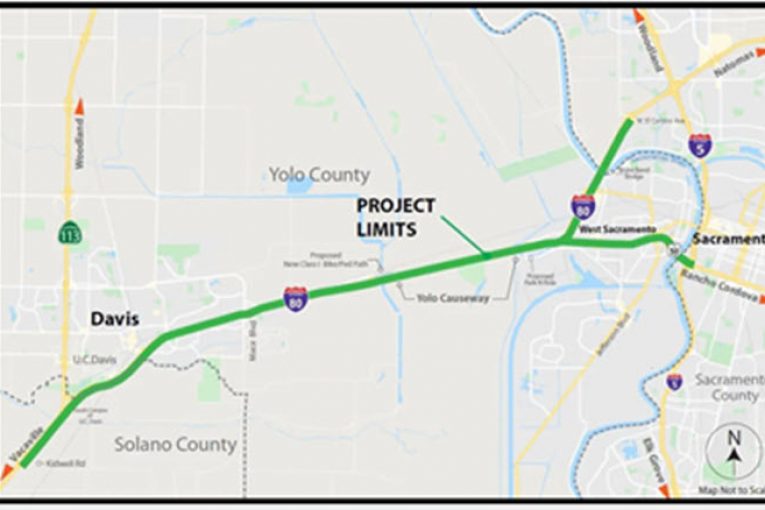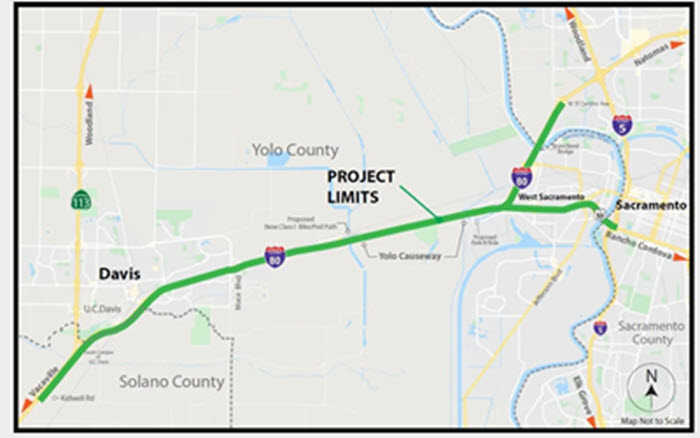

By David M. Greenwald
Executive Editor
A few weeks ago, the I-80 expansion project drew an article in the LA Times. The Times noted that the road that connects the Bay Area to the State Capital “has become a symbol and a test of both the future of highway expansion in California and the climate change policies that seek to restrict it.”
CalTrans has argued that “the I-80 project would cut greenhouse gas emissions by reducing congestion.”
But, the Times points out that “researchers say decades of academic work show it will do the opposite in the long run.”
The article quotes Davis’ Alan Pryor.
“Caltrans only knows one way of doing things, and that’s build wider freeways,” said Alan Pryor, chair of a local Sierra Club chapter, which has filed a lawsuit with the Environmental Council of Sacramento. “We have to challenge them and say, ‘No, you have to comply with state law’ … and minimize our dependence on automobiles going forward.”
But in his latest column, columnist Dan Walters of CalMatters called this notion ridiculous.
“Some things are just so ridiculous that they demand critical attention. One of them is the opposition from environmental groups to widening the Interstate 80 freeway between Sacramento and Davis,” he writes.
The problem as he sees it is the “Davis bottleneck” (yes, Davis)—that “backs up traffic for miles.”
“What should be no more than a 10- or 15-minute drive can often take 45 minutes or more,” he adds.
That there might be other ways to solve that problem doesn’t seem to occur to Walters nor does he take seriously the data that suggests people adjust their driving patterns to avoid bottlenecks and that opening a bottleneck doesn’t solve the problem in the long run—it might make it worse it.
Instead, Walters turns the environmentalists into the “bad guys.”
He notes, derisively, “Environmentalists, who are trying to block the project in court, contend that it would merely encourage more drivers to use the stretch of freeway and therefore relief from congestion would be only temporary.”
Walters cites Susan Handy, based on UC Davis, in the same LA Times article: “These projects are being oversold to the public as a way to reduce congestion; they are not.”
But Walters shrugs this off writing, “The complaints might have some validity if this stretch was merely another local commuter route, but it isn’t.”
He adds, “Moreover, there are no alternative routes because the eastern portion of the freeway is a causeway over a marshy area that’s home to wildlife and is often flooded during winter and spring months.”
He continued, “Simply put, trucks and cars must either use I-80 between Sacramento and the Bay Area or not move at all. The notion that widening will increase traffic is ludicrous: The traffic will be there regardless because it has nowhere else to go.”
Walters also has a point here—which is what makes this issue both difficult and interesting.
As Autumn Bernstein, who directs the Yolo Transportation District, told the LA Times: “We experience some of the most severe congestion in California seven days a week. We have more than five hours of congested traffic in the eastbound direction and (in) Davis every afternoon.”
Ultimately, Walters focuses on the traffic rather than the environmental concerns with climate change and dismisses the notion that such projects that increase capacity “lead to more traffic.” And he does so without offering alternative data or analysis.
The Times article presented a fair picture of the debate—the need to address congestion and the impact of congestion on GHG emissions on the one hand, and the problems with attempting to solve the problem simply through increasing carrying capacity, which other studies suggest leads to additional traffic.
Walters is correct to suggest that some of the demand for road use is inelastic on I-80. But that ignores the elastic component to it. There are times of day that people may well avoid going through the causeway because they know it will be congested—and to dismiss the idea that use will increase if capacity does, I think belies human nature.
It also ignores all the people who take SR 113 to Woodland to avoid the gridlock, who may change their route if congestion lightens up.
There are also concerns expressed in the LA Times article that CalTrans avoided some of these problems by dodging environmental review, and a good portion of the end of the LA Times article flags a number of environmental concerns that have nothing to do with the core issue—but could have been avoided through more careful planning.


Interstate 80 is a National resource. Built along the route of the first transcontinental railroad the demand for its efficient use by shippers and travelers overwhelms the concerns of provincial residents who rarely use I-80 for transport. The lawsuit will delay but not derail freeway expansion inconveniencing those stuck in traffic more than needed. It will also continue to inconvenience locals whose roads are clogged with those trying to avoid congestion on the freeway.
jerry Brown tried to not build his way out of freeway congestion back in the 70’s. It didn’t work then and it won’t work now.
Mr. Glick offers personal opinions, much as Walters did in his CalMatters column – that is, without a shred of evidence to support his views.
The concept of “induced demand”, whereby adding freeway capacity leads to increased usage and future congestion due to changing driver behavior, is established science based on decades of quantitative research. Indeed, Caltrans own regulations governing calculation of “induced demand” now specifically acknowledges the superiority and the accuracy of UC Davis’ world-renown National Institute of Sustainable Transportation method of calculating “induced demand”.
To be clear, however, the lawsuit filed by the Sierra Club and the Environmental Council of Sacramento (ECOS) simply demands that Caltrans fully acknowledge the “induced demand” that will be created by this freeway expansion project in their environmental analysis of the project and propose sufficient mitigation to offset the increased vehicular traffic produced as a result. Caltrans has woefully failed in this regard and the lawsuit attempts to drag them, kicking and screaming, into the 21st century, and require them to do so in the future while also mitigating for the specific adverse impacts of this project – AS REQUIRED UNDER CALIFORNIA LAW.
78% of the greenhouse gas emissions attributed to Davis are transportation-related and the vast majority of those are due to single occupancy personal car use. Perhaps if we had all listened to Jerry Brown in the 70s and made the investments he then proposed in alternative high speed rail and other public transit infrastructure, the climate crisis would not be as severe as we face today.
Or does Mr. Glick also deny the science of climate change?
I loved it when the obviously hypocritical and false environmentalists in Davis got outvoted by the rest of the State. Despite people already trying to avoid I-80 congestion it grows progressively worse over time. The false environmentalists would have us do nothing indefinitely. Their ‘solution’ is public/mass transit. What a crock.
It’s no wonder that outside of selected major metropolitan areas (definitely not the greater Sacramento region), only 5% of commuters bother to use public/mass transit. I surmise that in those few metropolitan areas where a large percentage of commuters actually take public/mass transit they do so because driving is too inconvenient. Conversely in the rest of the United States so few utilize public/mass transit because it’s easier, simply too inconvenient and they don’t want to adjust their schedules to rigid transit schedules. People that own vehicles are predisposed to using them. Sometines false environmentalists give lame excuses why they supposedly must drive.
Walter
You still haven’t addresses the point that widening the freeway is likely to induce more demand which will then create more congestion. Perhaps the addition of toll lanes will mitigate this congestion sufficiently, but that still leaves us with getting people out of the single-occupancy cars. Otherwise we’ll just be running in place again with drivers going through town to get to the head of the line over the Causeway.
As for relative public subsidies, transit in other countries have much lower (even zero) fares so I don’t know how they could have lower public subsidies. The math doesn’t square.
The demand is already induced by previous growth. Will we need another round of expansion in the future from more growth. Most probably.
Is I80 not part of the interstate system? Is it not a major shipping route? You can have your own beliefs but not your own facts.
your suit will cause some delay and might lead to some changes but in the end it isn’t going to stop the expansion of I80.
do I believe in global warming? Yes.
There is a proper way to address climate change and a wrong way. Preventing the widening of I-80 is the wrong way. Mass transit will never be economically feasible given our existing poor infrastructure, our still vast open spaces and our inability to give up convenience, freedom and our economic wealth. Counties that have the required infrastructure built it decades ago when costs were much more reasonable. The longer you wait the higher your costs are. The false environmentalists will never give up their vehicles, so why should anyone else. Financial wealth enables most people to afford to buy and pay the ongoing costs of vehicles. That’s why you mostly see people that can’t afford vehicles using alternative modes of transportation such as students and low income residents. The automobile was invented in the US. Car culture has been celebreated here for decades. Why are there car shows/exhibitions but few public new train shows? Why is it still considered a rite of passage for young adults to drive? Why are there businesses like Sonic that rely solely on customers with cars? Why do restaurants with drive thrus make more money from them than dine in and take out customers? Many Americans are so lazy or impatient to even get out of their cars to purchase and pick up food.
False and Hypocritical Environmentalists:
Why should I willingly give up convenience, my time and my freedom? I will let some poor schmuck do that instead of me.
“Countries” instead of “Counties”